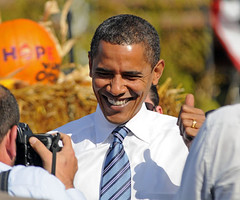------------------
SINGAPORE - The portable flamethrower was considered the very latest in weapons technology during the First World War. The British developed the self-igniting device with a range of 100 yards (91 metres) specifically for torching German trenches during the Battle of the Somme in 1916.
World War II saw the introduction of cruise missiles, jet-engine fighter planes and submarines as the Allies pitted their wits against the Third Reich in the battle to control land, sky and sea.
Now, missile strikes from unmanned drones have emerged as the breakthrough technology which has seen the West regain dominance in the war on terror.
For the
United States government, robotic warfare rules, although critics say it has turned the conflict into a video game.
US President
Barack Obama has upped the number of drone strikes on terrorists in Pakistan and Afghanistan from once a week to every day as the strategy begins to pay dividends.
When asked if warfare was entering a new era, US defence expert, Mr P W Singer, said: "You can compare the impact of this with the introduction of gunpowder."
The
RQ-1 Predator drone (picture) has become the main
unmanned aerial vehicle used for the offensives. It can fly 400 nautical miles (644 km) to a target and loiter overhead for up to 14 hours. It will then, if required, fire two Hellfire missiles before returning to base.
While the CIA has refused to share even the most basic data on the remote-controlled attacks, it has emerged that recent advances have come from US spies paying Pakistani informants to identify targets.
It is believed the agents on the ground are placing electronic chips at farmhouses occupied by Al Qaeda officials so they can be bombed by Predator planes.
The whole project is shrouded in secrecy and intelligence analysts have been unable to obtain either a list of military targets of drone strikes or the actual results in terms of Al Qaeda or civilians killed.
Interestingly, military insiders say they are seeing higher levels of stress in the CIA officials who launch the drone strikes from the office, than soldiers in actual combat situations.
Mr Singer added: "Traditional bomber pilots don't see their targets. A remote operator sees the target upclose - the explosion and the aftermath. You're further away physically but you see more. Also the drone war takes place 24/7, 365 days a year."
But President Obama has continued to use the drones as a critical tool in the revised policy on
Taliban insurgency in Afghanistan, as well as militant hideouts in neighbouring Pakistan.
A report by the American think-tank, the New American Foundation, revealed that while there had been 45 drone attacks during President
George W Bush's two terms, the Obama administration had launched 51 strikes in its first year alone.
They estimate the offensives have killed more than 1,200 people, including 20 Al Qaeda leaders. It is believed that at least one third of the dead were civilians. But despite the huge amount of collateral damage, US top brass clearly believe the strategy is paying off.
Last week, it was announced the Al Qaeda leader who masterminded the attack on the CIA HQ in Afghanistan was killed by a drone missile in North Waziristan, Pakistan. A counterterrorism official said Hussein Al Yemeni was killed outright in the strike and now the terror group's leadership have been forced deeper into hiding and are struggling to plan new operations.
In fact, so intense is the offensive in the area that it is said that people living there are developing psychological disorders because of the constant fear and anxiety. The drone strikes have attracted much criticism with international lawyers even questioning the legality of the programme.
Mr Gary Solis, a professor at
Georgetown University Law Center, said: "CIA agents are, unlike their military counterparts but like the fighters they target, unlawful combatants. No less than their insurgent targets, they are fighters without uniforms or insignia, directly participating in hostilities, employing armed force contrary to the laws and customs of war."
He added: "Even if they are sitting in Langley, the CIA pilots are civilians violating the requirement of distinction, a core concept of
armed conflict, as they directly participate in hostilities."
Paul Gilfeather
From TODAYOnline.com, Tuesday, 23-Mar-2010
----------
 Image via Wikipedia
Image via Wikipedia![Reblog this post [with Zemanta]](http://img.zemanta.com/reblog_e.png?x-id=25e1e2be-9300-41d2-ba3f-360cd027ece2)

![Reblog this post [with Zemanta]](http://img.zemanta.com/reblog_e.png?x-id=307b7a08-1a72-4198-8414-7c77085b8a73)

![Reblog this post [with Zemanta]](http://img.zemanta.com/reblog_e.png?x-id=38718796-512a-4cd5-b446-b29ea1db8f5f)

![Reblog this post [with Zemanta]](http://img.zemanta.com/reblog_e.png?x-id=28a93716-46ba-4982-8aba-345c850e0559)


![Reblog this post [with Zemanta]](http://img.zemanta.com/reblog_e.png?x-id=addd143f-e30f-4ebe-a7dd-6b09c2dbf9e3)


![Reblog this post [with Zemanta]](http://img.zemanta.com/reblog_e.png?x-id=9a468733-c71e-424a-ada1-66f5162991a5)
